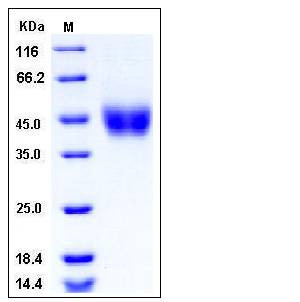Human FCRL1 / FCRH1 Protein (His Tag)
CD307a,FCRH1,IFGP1,IRTA5
- 100ug (NPP3856) Please inquiry
| Catalog Number | P11536-H08H |
|---|---|
| Organism Species | Human |
| Host | Human Cells |
| Synonyms | CD307a,FCRH1,IFGP1,IRTA5 |
| Molecular Weight | The secreted recombinant human FCRL1 consists of 298 amino acids and has a calculated molecular mass of 32.6 kDa. It migrates as an approximately 45 kDa band in SDS-PAGE under reducing conditions due to glycosylation. |
| predicted N | Ala 17 |
| SDS-PAGE |  |
| Purity | > 98 % as determined by SDS-PAGE |
| Protein Construction | A DNA sequence encoding the human FCRL1 (NP_001890.1) extracellular domain (Met 1-Asn 303) was fused with a polyhistidine tag at the C-terminus. |
| Bio-activity | |
| Research Area | Immunology |Innate Immunity |Fc Receptor |
| Formulation | Lyophilized from sterile PBS, pH 7.4, 1mM EDTA 1. Normally 5 % - 8 % trehalose and mannitol are added as protectants before lyophilization. Specific concentrations are included in the hardcopy of COA. |
| Background | Fc receptor-like protein 1, also known as FcR-like protein 1, Fc receptor homolog 1, IFGP family protein 1, Immune receptor translocation-associated protein 5 and FCRL1, is a single-pass type I membrane protein which contains three Ig-like C2-type (immunoglobulin-like) domains. It is a cell-surface membrane protein belonging to FCRL family and is preferentially expressed on B cells. FCRL1 is primarily expressed in secondary lymphoid tissues by mature subsets of B cells. It is detected in spleen, lymph node, heart, skeletal muscle, kidney, liver and placenta. FCRL1 is specifically expressed by mature B lineage cells with higher expression in naive versus memory B cells (at protein level). Human Fc receptor-like molecules (FCRL1, FCRL2, FCRL3, FCRL4, FCRL5) have tyrosine-based immunoregulatory potential and are expressed by B-lineage subpopulations. FCRL1 may function as an activating coreceptor in B cells. It may also function in B cells activation and differentiation. |
| Reference |
